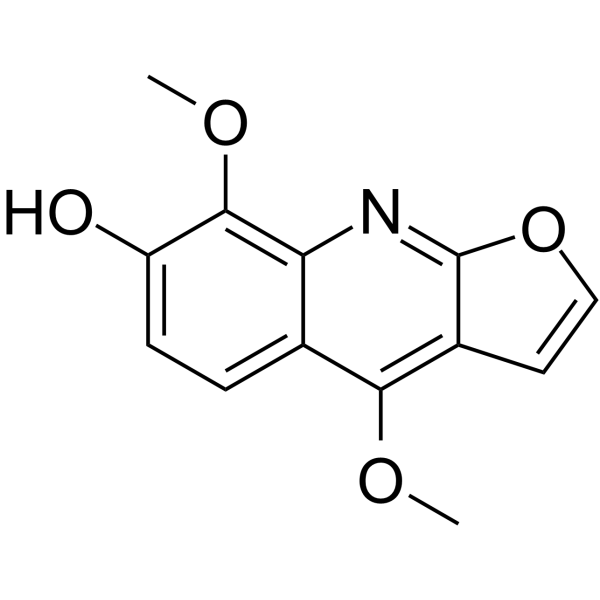
Haplopine
CAS No. 5876-17-5
Haplopine( —— )
Catalog No. M31361 CAS No. 5876-17-5
Haplopine shows photo-activated antimicrobial activity against S. aureus. It exhibits potent melanogenesis-inhibitory activities with almost no toxicity to the cells.
Purity : >98% (HPLC)
 COA
COA
 Datasheet
Datasheet
 HNMR
HNMR
 HPLC
HPLC
 MSDS
MSDS
 Handing Instructions
Handing Instructions
| Size | Price / USD | Stock | Quantity |
| 5MG | 873 | In Stock |


|
| 50MG | Get Quote | In Stock |


|
| 100MG | Get Quote | In Stock |


|
Biological Information
-
Product NameHaplopine
-
NoteResearch use only, not for human use.
-
Brief DescriptionHaplopine shows photo-activated antimicrobial activity against S. aureus. It exhibits potent melanogenesis-inhibitory activities with almost no toxicity to the cells.
-
DescriptionHaplopine shows photo-activated antimicrobial activity against S. aureus. It exhibits potent melanogenesis-inhibitory activities with almost no toxicity to the cells.
-
In Vitro——
-
In Vivo——
-
Synonyms——
-
PathwayOthers
-
TargetOther Targets
-
Recptor——
-
Research Area——
-
Indication——
Chemical Information
-
CAS Number5876-17-5
-
Formula Weight245.2
-
Molecular FormulaC13H11NO4
-
Purity>98% (HPLC)
-
Solubility——
-
SMILES——
-
Chemical Name——
Shipping & Storage Information
-
Storage(-20℃)
-
ShippingWith Ice Pack
-
Stability≥ 2 years
Reference
molnova catalog



related products
-
MAO-B-IN-5
MAO-B-IN-5 is a potent, selective, and orally active MAO-B inhibitor with an IC50 of 0.204 μM, showing potential for research in Parkinson's disease (PD) .
-
Azetidine-2-carboxyl...
Azetidine-2-carboxylic acid is a non proteinogenic amino acid homologue of proline found in common beets. Azetidine-2-carboxylic acid can be misincorporated into proteins in place of proline in many species including humans. It is a toxic and teratogenic agent.
-
Carboxypeptidase G2 ...
Carboxypeptidase G2 (CPG2) Inhibitor (CPG2 Inhibitor) is a new CPG2 Inhibitor with antitumor activity.



 Cart
Cart
 sales@molnova.com
sales@molnova.com


